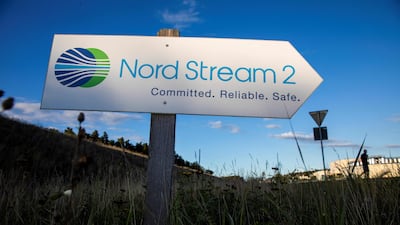January is the cruellest month when it comes to European gas demand. It is now the end of February and the continent has almost a year to bolster its strategic energy autonomy as the Russian attack on Ukraine continues.
Europe cannot replace all its Russian gas imports overnight — which amounts to 30 per cent of the EU total, of which 8 per cent transits through Ukraine. Even stopping buying gas from Moscow would not halt the attack — it made up 12 per cent of the country’s exports in December, an amount for which the Kremlin has probably made contingency plans.
There are three elements that may reduce or interrupt supply: military action, a Russian decision or Western sanctions.
Is this Mr Putin’s last territorial demand in Eurasia? It’s hard to imagine so if he successfully subjugates Ukraine. He has already rescued a Kazakh president and effectively reduced accomplice Belarus to subservience. Russian troops have long been stationed in the breakaway Transnistria statelet of non-Nato Moldova, which borders Ukraine.
Occupying Ukraine in the face of resistance will be destructive. If Germany holds firm on not certifying the Nord Stream II pipeline, the transit of Russian gas through Ukraine is still required — which could be interrupted by sabotage, accident, Moscow’s ukase (decree or order) or a European ban.
Moscow engineered Europe’s acute vulnerability in the run-up to this crisis, deliberately cutting back exports to empty gas storage. A rather mild winter, with the war coming as spring approaches, has saved Europeans so far.
However, this will not last. Dmitri Medvedev, Russia's former president and once chairman of Gazprom, tweeted: “Welcome to the brave new world where Europeans are very soon going to pay €2,000 [$2,254] for 1,000 cubic meters of natural gas!” This is twice the (already elevated) current price.
The initially weak European and American sanctions have just been toughened by much wider financial measures. The major hole is energy: oil, gas and coal, which comprised 60 per cent of Russian exports in 2019. Mr Medvedev’s message is clearly meant to deter any direct rules against Russian energy exports.
Brent crude prices soared 8.78 per cent to $105.34 on Thursday, then dropped back to $97.93 on Friday after US President Joe Biden announced that sanctions would not target energy supply — not even wood or coal. The US bans the import of Venezuelan and Iranian oil, but still allows Russian crude — even though it is a net exporter.
Efforts are under way to bar Russia from the Swift bank messaging system, along with outright prohibitions on dealing with some leading Russian banks and moves to freeze the country's central bank reserves.
Predictably, the crisis reinforces everyone’s prior strategies: environmentalists advocate getting off fossil fuels faster, nuclear supporters want reactors to keep running and traditional energy security practitioners argue for more diversified gas imports. Many don’t appear to realise that they’re all right — to an extent — and tearing down each other’s arguments is not constructive in a crisis.
So Europe needs more non-Russian gas. To reassure climate hawks, this does not mean importing more gas overall or relaxing the drive to get off fossil fuels. It’s a recognition that it would be better to produce domestically or buy gas from the US, Africa or the Gulf, and that this will come at a higher cost — which itself facilitates the job of displacing gas.
Rules can be set to fill storage facilities before winter — and the Gazprom-owned facilities in Europe taken over. Running liquefied natural gas (LNG) import terminals at maximum may simply not be possible during the low-demand summer period — unless more storage is constructed.
The Netherlands’ giant Groningen field, being decommissioned over issues of earth tremors, could be revived temporarily. Much of Europe’s LNG import capacity is in Spain, which is poorly connected to the rest of the continent but emergency connections to France can be can be sped up.
Germany has announced that it will build two new LNG import terminals but these are only useful if there is enough gas on the global market. New LNG export facilities cannot be built overnight — probably two-and-a-half years at best for new US plants, longer elsewhere. The Biden administration could, though, expedite permits for four expansion projects that would, quite soon, add equivalent capacity to the Nord Stream II pipeline, or almost a third of typical Russian sales to Europe.
Germany and Belgium could halt the retirement of their remaining nuclear reactors, at least until dependence on Russian gas is eliminated. Coal-fired power plants will probably fire up, which may require relaxing European carbon pricing briefly. Solar power can be installed quickly, saving gas in summer for storage. Building wind power takes longer, but should also be hastened.
Electricity generation accounts for only about a third of European gas use. There is a need for contingency plans for the roughly 30 per cent going to industry, probably requiring rationing and decisions on which industries are “critical”.
European governments will also not allow their citizens to freeze next winter. About 44 per cent of gas is used in buildings — mostly winter heating. That demands rapid action to boost insulation, install electrically driven heat pumps and solar water heaters, and protect low-income consumers. Still, even a crash programme will only have a limited effect this year.
The continent cannot cut itself off from Russian gas entirely without severe economic pain. Governments will have to be honest with their citizens and explain the necessity. The decision may be made for them anyway.
By 2030, options expand dramatically. After the 2014 annexation of Crimea, Europe made some improvements to its energy security — but there was a failure of imagination and political will to make radical changes. Europeans should beware not to waste the next eight years — and especially not the next eight months.
Robin M. Mills is the chief executive of Qamar Energy and author of The Myth of the Oil Crisis


